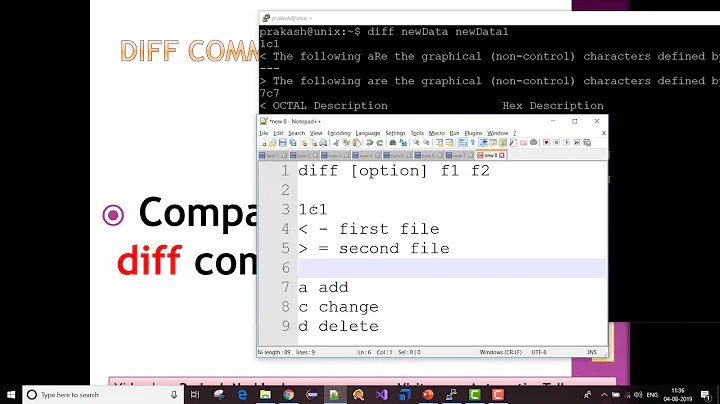unix test when to use eq vs = vs == in test commands?
Solution 1
Because that's the definition for those operands. From POSIX test documentation, OPERANDS section:
s1 = s2
True if the strings s1 and s2 are identical; otherwise, false.
...
n1 -eq n2
True if the integers n1 and n2 are algebraically equal; otherwise, false.
== is not defined by POSIX, it's an extension of bash, derived from ksh. You shouldn't use == when you want portability. From bash documentation - Bash Conditional Expressions:
string1 == string2
string1 = string2
True if the strings are equal. ‘=’ should be used with the test command for POSIX conformance.
Solution 2
Symbol = is used for string comparison while -eq for integer comparison. Both work with test and with [...]. If you are using bash then with syntax [[...]] you can use also == for string comparison. Additionally in bash = and == with [[...]]works for patterns too (as for example [[ $x == y* ]].
Solution 3
In a more elaborate way
Following sequences can help :
gnu:~$ [ sam -eq sam ]
bash: [: sam: integer expression expected
gnu:~$ echo "Exit status of \"[ sam -eq sam ]\" is $?."
Exit status of "[ sam -eq sam ]" is 2.
gnu:~$ [ 5 -eq 5 ]
gnu:~$ echo "Exit status of \"[ 5 -eq 5 ]\" is $?."
Exit status of "[ 5 -eq 5 ]" is 0.
gnu:~$ [ 5 = 5 ]
gnu:~$ echo "Exit status of \"[ 5 = 5 ]\" is $?."
Exit status of "[ 5 = 5 ]" is 0.
gnu:~$ [ sam = sam ]
gnu:~$ echo "Exit status of \"[ sam = sam ]\" is $?."
Exit status of "[ sam = sam ]" is 0.
gnu:~$ [ 5 == 5 ]
gnu:~$ echo "Exit status of \"[ 5 == 5 ]\" is $?."
Exit status of "[ 5 == 5 ]" is 0.
gnu:~$ [ sam == sam ]
gnu:~$ echo "Exit status of \"[ sam == sam ]\" is $?."
Exit status of "[ sam == sam ]" is 0.
gnu:~$ (( 5 == 5 ))
gnu:~$ echo "Exit status of \"(( 5 == 5 ))\" is $?."
Exit status of "(( 5 == 5 ))" is 0.
gnu:~$ (( sam == sam ))
gnu:~$ echo "Exit status of \"(( sam == sam ))\" is $?."
Exit status of "(( sam == sam ))" is 0.
gnu:~$ ( sam = sam )
The program 'sam' is currently not installed. You can install it by typing:
sudo apt-get install simon
gnu:~$ echo "Exit status of \"( sam = sam )\" is $?."
Exit status of "( sam = sam )" is 127.
gnu:~$ ( 5 = 5 )
5: command not found
gnu:~$ echo "Exit status of \"( 5 = 5 )\" is $?."
Exit status of "( 5 = 5 )" is 127.
gnu:~$ ( sam == sam )
The program 'sam' is currently not installed. You can install it by typing:
sudo apt-get install simon
gnu:~$ echo "Exit status of \"( sam == sam )\" is $?."
Exit status of "( sam == sam )" is 127.
gnu:~$ ( 5 == 5 )
5: command not found
gnu:~$ echo "Exit status of \"( 5 == 5 )\" is $?."
Exit status of "( 5 == 5 )" is 127.
Solution 4
From man test:
-eq , etc.
Relay to arithmetic tests. The arguments must be entirely numeric (possibly negative), or the special expression `-l STRING', which evaluates to the length of STRING.
STRING1 = STRING2
True if the strings are equal.
STRING1 == STRING2
True if the strings are equal (synonym for =).
So = and == are synonyms
Related videos on Youtube
Comments
-
Michael Durrant almost 2 years
When should I use
-eqvs=vs==e.g.
[[ $num -eq 0 ]] [[ $num = 'zzz' ]]I've observed a pattern of using
-eq(and-ne, etc.) for numbers and=for strings. Is there a reason for this and when should I use==
![test command to check condition | =~ operator in [[ ]] | [ ] vs [[ ]] | advance features of [[ ]]](https://i.ytimg.com/vi/zhOl33qIItw/hq720.jpg?sqp=-oaymwEcCNAFEJQDSFXyq4qpAw4IARUAAIhCGAFwAcABBg==&rs=AOn4CLCS43upA_5UISXGCCONRsbVhfm7pQ)



